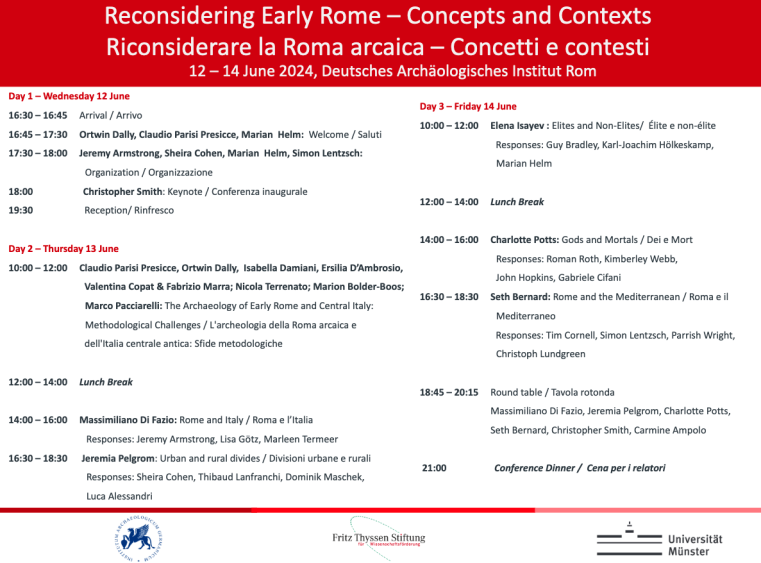28th – 29th October 2022
The early Roman Republic has experienced a flurry of scholarly activity and has been the center of several lively debates in the last decade. This activity inspired the founding of the research hub “Debating Early Rome” in 2021, which features a biannual series of online exchanges that explore crucial topics and controversies regarding the history of Early Rome and Italy. Organized by Jeremy Armstrong (University of Auckland), Sheira Cohen (University of Michigan), Marian Helm (Westfälische Wilhelms-Universität Münster), and Simon Lentzsch (Université de Fribourg), DER engages in these debates and aims to bring together different perspectives, approaches, and academic cultures in a joint group to broaden the discussion and mutual exchange on this fascinating period.
The online seminar series has facilitated the creation of a dedicated group of international scholars whose presentations and contributions to the conversation have allowed us to investigate and interrogate central developments, controversial issues, and also different methodological positions in regard to Early Rome. The upcoming conference “Rethinking Early Rome” will provide the chance to cement our online achievements to date in person and carve out the common ground on how to evaluate and employ the textual and material evidence, as a necessary first step to a new interpretation of the early Roman Republic.
The conference consists of five panels, bringing together a core group of the online participants from across a range of academic levels and cultures. The first day starts off with a general introduction of the research program followed by the first panel on key methodological challenges and an evening keynote by Prof. Dr. Ortwin Dally. The second day features four panels of three 20-minute presentations to be followed by combined discussions for each panel. The day’s debates will be concluded by a joint response by Prof. Dr. Tim Cornell and Prof. Dr Karl-Joachim Hölkeskamp.
DAY 1 – Friday, 28th October
(KTh I, Johannisstr. 8-10)
15:00– 15:15 Opening/Welcome
Hans Beck, Director Classical Studies WWU Münster
15:15 – 15:45 Organization and state of the project
Jeremy Armstrong, Sheira Cohen, Marian Helm, Simon Lentzsch
15:45 – 19:00 Session 1: Methodology & interdisciplinary approaches (Achim Lichtenberger)
Andrea Brock (St Andrews): The changing environment of the Tiber Valley
Roman Roth (Cape Town): Burial and Society: Etruria, Samnium and Rome, c. 450 – 250 BC
16:45 – 17:00 Coffee Break
Marian Helm (Münster): Structural Facts 2.0 – Correlating Archeological Evidence and Literary Sources
Christoph Lundgreen (Dresden): Debating Roman “Staatlichkeit”
18:30 – 18:45 Discussion of Session 1
19:00 – 19:30 Keynote
Ortwin Dally (DAI Rome)
19:30 Reception in the Archaeological Museum of the WWU
DAY 2 – Saturday, 29th October
(JO 101, Johannisstraße 4)
9:00 – 10:45 Session 2: The economy of Early Rome and Italy (Simon Lentzsch)
Dominik Maschek (Trier): The economy of city-building
Sheira Cohen (Michigan): Mapping Exchange Networks in Central Italy: Economies on the Move
Peter Attema (Groningen): Settlement excavations at Satricum and Crustumerium, new evidence of the earliest phases (9th to 7th c. BC)
10:30 – 10:45 Discussion of Session 2
10:45 – 11:00 Coffee Break
11:00 – 12:45 Session 3: Sanctuaries and community (Sheira Cohen)
Guy Bradley (Cardiff): The ludi Romani and the emergence of a Roman identity
Marion Bolder-Boos (Mainz): Cults and the Colonies: Diversity and Conformity in the Sanctuaries of Republican Italy
John Hopkins (New York): The Religious Landscape of the urbs
12:30 – 12:45 Discussion of Session 3
12:45 – 14:30 Lunch Break
14:30 – 16:15 Session 4: The institutions of the early Roman community (Marian Helm)
Kimberley Webb (Oxford): Collegiality: the auspices and magistrates in early Rome
Christopher Degelmann (Berlin): Rituals of integration: the transvectio equitum
Marie Föllen (Bochum): The Senate and Roman Expansion (3rd to 2nd century BCE)
16:00 – 16:15 Discussion of Session 4
16:15 – 16:30 Coffee Break
16:30 – 18:45 Session 5: International Relations in Italy (Jeremy Armstrong)
Elena Isayev (Exeter): Mobility beyond Migration
Lisa Götz (Augsburg): Layers of Roman colonial and Auruncan interaction – changing perspectives on the microregion of the Garigliano estuary
Stéphane Bourdin (Lyon): The peoples of central Italy
Marleen Termeer (Nijmegen): Roman and Italian coinage
18:30 – 18:45 Discussion of Session 5
18:45 – 19:00 Coffee Break
19:30 – 20:15 Response
Tim Cornell & Karl-Joachim Hölkeskamp
20:30 Conference Dinner


